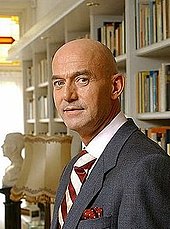Leefbaar Nederland

Leefbaar Nederland - LN (" Livable Netherlands") was a Dutch party founded on March 25, 1999. Originally more liberal and rooted at the local level, the movement later adopted right-wing populist ideas. In 2001/2002, her top candidate was Pim Fortuyn for a short time . In 2006 it was dissolved.
The movement , which emerged as a grassroots movement, was initially created at the local level. Founders of the party at national level were among others the chairman of Leefbaar Hilversum, Jan Nagel, who also became the first chairman of Leefbaar Nederland, the singer Henk Westbroek and the radio presenter Willem van Kooten .
On July 27, 2006, it became known that the party would not participate in the 2006 elections to the Second Chamber and would be dissolved. The reason was that the party was over-indebted. Local parties such as Leefbaar Hilversum, Leefbaar Utrecht, Leefbaar Rotterdam or Leefbaar Delft still exist.
aims
Originally, the party had no clear political profile, but emerged as a bourgeois protest movement that was dissatisfied with the deadlocked politics at the national level and the increasingly deteriorating working and living conditions. The actions of these small communal city parties or groups of citizens were occasionally left-wing, but mostly clearly interpreting the right, remained overall diffuse and had different successes in the various communes.
The protests mainly centered around putting politics back "in the hands of the people" and allowing the citizens direct influence over the government, which the established parties had taken from them. Just as the aristocratic-bourgeois elite of the 18th century divided the political offices among themselves, the “rulers”, so do the professional politicians of the established parties today. In order to break this “party cartel”, Leefbaar Nederland wanted to give citizens the opportunity to directly elect their mayors and the prime minister. In addition, laws should be able to be corrected by referendums.
However, these demands were not entirely new in the Netherlands; they have already been discussed by Democrats 66 and in some cases by GroenLinks . Leefbaar Nederland, however, did not want to be attributed to the left-wing parties and also sought to “disempower” “professional politicians” and “all bureaucrats” and to reform asylum policy.
Pim Fortuyn

The program and activities of Leefbaar Nederland were often clumsy and comparatively cautious, because the party lacked a central figure that could attract the public. Jan Nagel had worked in the television business long enough to know what qualities such a person had to have and how to find them. In August 2001 he found the charismatic Pim Fortuyn, who had already been elected the top candidate at the November 2001 party congress.
This radicalized the party program. He combined the criticism of the political system with attacks on the Dutch asylum and immigration policy and against the principles of the polder model : A modern, dynamic and cosmopolitan economy like that of the Netherlands does not need old-fashioned “corporatism”. Without “paternalistic intervention” by the trade unions, workers would better defend their rights themselves, as they would have joined the elite of employers' associations and career politicians who only care about themselves and no longer care about the real problems of the people. This is particularly evident in asylum and immigration policy. The inadequate integration of foreigners has led to uncertainty, alienation and neglect in the big cities, but any discussion about it is taboo by “the elite” . Anyone who denounces such abuses will be insulted and silenced by the media (which is also dominated by “the elite”) as right-wing extremists.
In order to break this taboo, Article 1 of the Dutch Constitution must be deleted, which prohibits discrimination and, for example, makes it difficult for him to describe Islam as a backward culture, while conversely a Muslim can say with impunity that homosexuals are less valuable than pigs
These statements by Fortuyn were not discussed with the party leadership and a break occurred. Other parties loudly criticized Fortuyn, while Fortuyn's popularity among parts of the population rose. After that, Leefbaar Nederland found a new top candidate with great difficulty: Fred Teeven , a public prosecutor who had made a certain name for himself as a crime fighter , but had no charisma.
elections

In the elections to the Second Chamber in May 2002, the party won only two seats, despite the promising election campaign. At the same time, Leefbaar Nederland lost three quarters of its supporters. Fortuyn, on the other hand, had taken his impressive poll results with him to his hastily founded party, Lijst Pim Fortuyn . Despite the assassination of Fortuyn shortly before the election, it achieved the second best result of all parties on the spot.
Before the elections to the Second Chamber in January 2003, there was renewed unrest in Leefbaar Nederland when the party leadership unexpectedly proposed Emile Ratelband as the new top candidate. Fred Teeven withdrew from the party, and at a tumultuous party congress, Haitske van der Linde, who was just 22 years old, was elected as the top candidate. The party lost both of its seats in the elections, after which it became increasingly quiet. Leefbaar Nederland was never represented in the First Chamber.
Leefbaar Nederland did not take part in the national parliamentary elections in 2006.
Individual evidence
- ↑ http://www.parlement.com/9291000/modulesf/g3ihd999#par2
- ↑ Communication from the party dated November 8, 2006: Archived copy ( memento of the original dated November 13, 2002) Info: The archive link was automatically inserted and not yet checked. Please check the original and archive link according to the instructions and then remove this notice.
- ^ See De Volkskrant interview, published February 10, 2002.
- ↑ http://www.parlement.com/9291000/modulesf/g3ihd999#par2
Web links
- Leefbaar website (Dutch)